Are you looking for ways to stop grinding your teeth or clenching your jaw?
Teeth grinding, or bruxism, is a condition which causes people to grind or clench their teeth in an involuntary way. Over time, this movement damages the teeth and may lead to jaw pain and headaches.
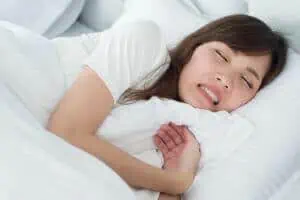
Bruxism can affect both adults and children. Although it’s more common for people to grind their teeth at night, it may also happen during the day. Sufferers usually aren’t aware they are doing it at all.
Why do people grind their teeth? This condition can be caused by a range of things, but it is most often attributed to stress or anxiety. It can be hard to stop teeth grinding completely, but there are many ways to lessen its effects. Most people begin by using a mouth guard at night.
In this article you can find out what causes bruxism, how to identify the symptoms, and what to do if you or someone you know is grinding their teeth.
What is bruxism?
This condition, also known as teeth grinding, involves excessive grinding or clenching of the teeth – usually without the person realising they are doing it. According to The Bruxism Association, it affects around 8-10% of the population and is most common in people aged 25-44.
Although we all sometimes grind or clench our teeth to some extent, people suffering from bruxism do it to the point that it starts to damage their teeth or cause other medical problems.
The condition can manifest itself in two ways:
- Dynamic bruxism involves grinding jaw movements from side to side or from front to back, and usually occurs during sleep.
- Static bruxism is a clenching of the jaw or teeth without making a sound, and more often happens during the day.
Grinding teeth at night
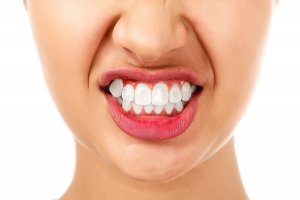
Nocturnal bruxism, the term for grinding your teeth in your sleep, represents 80% of cases. Also known as ‘sleep bruxism’, it involves adults or children grinding their teeth in their sleep in an involuntary and unconscious manner.
Sleep bruxism often occurs alongside other sleep disorders such as snoring and sleep apnoea. Patients commonly experience fatigue as their sleep is so badly disrupted. The same goes for anyone who may be sharing a room with them.
If you wake up with an aching jaw and sore teeth, you are most likely grinding your teeth at night or sleeping with a clenched jaw. Another sign of nighttime jaw clenching can be waking up with a headache. All of these signs point to a problem with your jaw joints, known as your temporomandibular joints. This can be worse during seasons of life where you’re stressed, or it can just be a chronic problem that needs to be treated with a custom-made bruxism guard.
Dr. Brandon Murri, Family & Cosmetic Dentistry of the Rockies
If you notice your partner grinding their teeth in their sleep, bring it to their attention. Encourage them to visit a dentist, who can check for signs of wear on teeth. Following diagnosis, there are various ways to reduce any oral damage and identify the underlying cause.
In some cases it may be necessary to study a patient’s sleep patterns, which involves spending a night at a sleep laboratory in a hospital. The majority of cases don’t require this, but for particularly problematic cases it can be the most reliable diagnosis.
Clenching teeth while awake
Clenching your jaw or teeth during the day can also put excessive stress on your jaw muscles and cause damage to your teeth. If you catch yourself with gritted teeth or a tense jaw, it may well be because of stress. The bruxism exercises we feature later on can help you relax the muscles in question.
Why do people grind their teeth?
Bruxism treatment is complicated by the fact that there are so many possible causes for the condition. In fact in some cases, the teeth grinding cause may never be known.
However, current medical knowledge points towards the following factors:
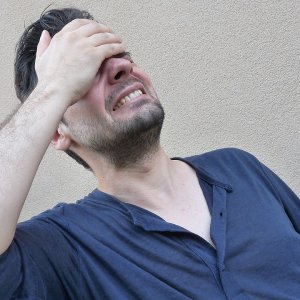
- Anxiety and stress – with teeth grinding or jaw clenching worsening as stress levels increase
- Dental malocclusion (misalignment of teeth) – although medical opinion is divided as to whether this is an outright cause, an aggravating factor, or a result of grinding
- Psychosocial problems
- Taking antidepressants
- Taking drugs such as ecstasy
- Smoking – smokers are five times more likely to experience problems
- High alcohol or caffeine consumption
- Sleep disorders
- Tongue tie
- Neurological conditions like Parkinson’s and Huntington’s disease
Genetic causes cannot be ruled out. There appears to be a link, but it has not yet been clearly demonstrated.
Of all these bruxism causes, stress and anxiety are by far the most common. Almost 70% of diagnosed cases result from stress, for example at work or school. People who don’t handle stress well are more likely to grind their teeth.
Most people experience stress to varying degrees at different times of their lives. Often when stress levels subside, the tooth grinding symptoms disappear too.
This BBC article may be several years old but it gives more information about the links between stress and bruxism. The reader comments at the end may be reassuring to people who have just been diagnosed with the condition.
Bruxism symptoms
Most people are unaware that they are grinding their teeth, especially at night. The most obvious symptom of bruxism is the sound of scraping and grinding. It is an unpleasant noise which those nearby are likely to notice.
But you can’t count on other people to mention this to you, so you should look out for other teeth grinding symptoms. These include:
- Muscle pain and tension around the jaw and the temporomandibular joint. This leads to a sensation of stiffness and can limit capacity to open the mouth wide.
- Earaches and tinnitus
- Headaches
- Pain around the neck, cheeks and shoulders
- Disrupted sleep or waking up feeling tired despite thinking you have slept for long enough
- Excessive wear on the surface of teeth (which can lead to tooth sensitivity)
- Broken fillings, crowns or other dental prostheses
- Cracked or fractured teeth
- Bleeding gums, especially at night
Your dentist will be able to check for signs that your teeth are being damaged by grinding. If you’re concerned, mention this at your next dental checkup.
Effects of teeth grinding and clenching
Damage to teeth
When teeth are put under sustained pressure, the outer layer of enamel starts to wear or chip away. This exposes the next layer of the tooth – dentin. Increased sensitivity to hot and cold is one sign that your teeth have reached this stage.
Teeth may also become yellow or discoloured. This is because dentin is an orangey-yellow colour and it’s the outer enamel which gives teeth their whiter appearance. When enamel is worn down, the colour of the dentin shows through.
When the protective layer of enamel erodes, teeth are at greater risk of decay and cavities. Teeth will also be more susceptible to becoming loose or fractures, especially in severe cases.
In addition, dental restorations and prostheses, including fillings, crowns, bridges and veneers, can easily become damaged from tooth clenching or grinding.
Damage to the jaw joint
Increased clenching and grinding puts greater strain on muscles and the temporomandibular joint (jaw).
You may notice your jaw feels particularly stiff or painful in the mornings, when you wake up. You may also notice it becomes harder to open your mouth fully, or it hurts to yawn.
Another sign of jaw clenching problems is that the joint starts to make alarming cracking or popping noises during movement from talking or eating. In more serious cases, the jaw can become locked, caused by joint displacement or arthritis in the joint.
Each patient will experience these teeth grinding symptoms to different degrees, but they certainly don’t help with stress or anxiety levels. In fact, the manifestation of these effects can make anxiety worse, resulting in a vicious cycle. This is especially true for people who have never heard of these bruxism symptoms – or even the condition itself – so are unsure whether to seek medical help.
Other consequences
In the most serious cases, there may be destruction of the alveolar bone, aggravation of periodontal illnesses, muscle pain in the head and mouth or even muscular hypertrophy (where the muscles grow to be abnormally large because of overuse).
Teeth grinding in children and babies
Are you worried about your baby or toddler grinding their teeth? Figures for bruxism in children indicate that around 20% of children can be affected. However, real figures may be higher as the condition can often go unnoticed or unreported.
A child grinding their teeth at night is considered a sleep disorder, and it can often lead to behavioural problems due to poor sleep patterns. An episode lasts on average for 4 seconds and can happen up to 6 times an hour during the night, making for a tired and irritable child the next morning.
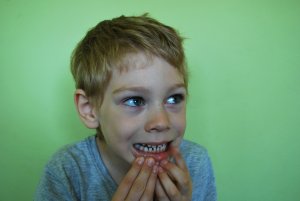
Of course it is also distressing for a parent to hear their child or baby grinding their teeth. It most often happens after the baby teeth or adult teeth first appear. By the time adult teeth are fully formed, the grinding behaviour should have stopped.
There appears to be a clear relationship between children grinding teeth and breathing irregularities such as breathing through the mouth due to obstructed airways. Some surgeries can address problems related to sleep disordered breathing.
Anxiety and stress have also been linked, although they may be a result of interrupted sleep rather than the cause of grinding teeth. Your child might be stressed because of bullying at school or some kind of disruption in their lives, so try talking to them to see if something is bothering them. In any case, calming activities before bedtime can reduce anxiety and hyperactivity.
Bruxism treatment
When you’re first diagnosed with bruxism, probably the first priority will be to stop teeth grinding from causing any further damage. Then, you can work on addressing the underlying causes.
Teeth grinding mouth guard
Most dentists will recommend patients try wearing a bruxism guard at night to protect their teeth.
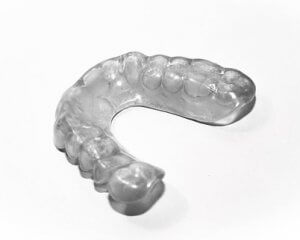
A mouth guard for teeth grinding creates disocclusion between the upper and lower jaw; in other words, they can no longer touch and cause abrasion to teeth. The teeth grinding guard also absorbs some of the pressure from clenching and grinding.
An added benefit is a big reduction in the noise from tooth grinding at night – which can be a huge relief for the patient’s partner!
The teeth are completely covered by the mouth guard so there is no contact between any upper and lower teeth.
Let’s be clear that a bruxism mouth guard is not a cure for this condition, no matter what the causes. It simply allows the jaw and muscles to relax and rest, thanks to the diminished pressure.
A mouth guard is not usually recommended for very young children whose facial and dental structure are still growing as it may interfere with normal dental development.
Bruxism mouth guard costs in the UK
Over-the-counter dental guards are available for around £15 – £40. Although affordable, these guards don’t offer a perfect fit and may not be as durable as custom-made varieties.
A better option is to ask your dentist about getting a custom mouth guard or splint. These are created from a dental impression and made in a laboratory to fit your teeth perfectly. The result is a more comfortable and longer-lasting product.
You may be able to get a bruxism mouth guard on the NHS, costing the band 3 treatment charge, which is £282.80 for 2020/21. Alternatively, a private dentist can provide one costing anywhere between £100 and £500.
Can you buy a mouth guard for teeth grinding online?
Yes, but be wary of the ‘one size fits all’ type. Some people have great success with these, whereas others find that only a custom-made mouth guard from a dentist helps with their bruxism pain. If you want to try a DIY version, these ones from Time2Sleep are a good option.
To make them fit, you must immerse the guards in boiling water and then mould them to the shape of your teeth. Some people find this process difficult, and it doesn’t guarantee a perfect fit. You might find that your teeth hurt after wearing a night guard if it doesn’t fit properly or if it’s too hard.
You can also order bruxism guards online with a professional UK dental service. You’ll be sent an impression kit to take your own teeth impressions at home, then a dental lab will make your teeth grinding guard and post it to you. This service costs less than half what you’d pay at an NHS dentist, without the inconvenience of trying to get an appointment.
Here’s a summary of where to buy a mouth guard to stop you grinding your teeth:
Type of Mouth Guard | Over-the-counter | Custom-made online service | Custom-made at a dental clinic |
Cost | £15 - £40 | £129 | £282.80 on the NHS; £100 - £500 privately |
Shape | Standard - one size fits all | Custom made to fit your mouth | Custom made to fit your mouth |
Life span | 3 - 12 months | Several years (with proper care) | Several years (with proper care) |
How to use | Boil in water to soften the plastic and fit to upper or lower teeth | Take teeth impressions at home and send them to the laboratory where your bruxism guard is made | A dental professional makes a cast of your mouth and sends it to a laboratory where the night guard is made |
We also have a separate article reviewing mouth guards, especially for those suffering from TMJ.
Other teeth grinding treatments
The following may also help to alleviate teeth grinding pain and sensitivity:
- Desensitising varnish: Applied by a dentist to protect teeth from sensitivities caused by erosion of enamel.
- Fluoride varnish or gel: Helps remineralise enamel and protect against decay.
- Orthodontic treatment: If a malocclusion is responsible for or caused by grinding, the patient may be able to wear braces to rectify the bite. Invisible braces may be preferable as they have the same protective effect as a mouth guard.
If you’re grinding your teeth at night, one possible remedy is simply to try and sleep on your side. You’re more likely to grind and clench your teeth while asleep on your back.
If you are grinding your teeth during the day, you can relax your jaw by making an ‘n’ sound repeatedly. Exercising regularly and moving throughout the day also prevents tensing up while working. Take the time to straighten your posture as a hunch pushes your jaw out, encouraging teeth to touch and grind.
Avoid caffeinated drinks such as coffee and energy drinks, as these are stimulants and encourage muscle movement. Both caffeine and alcohol also disrupt your sleeping patterns, increasing the chances of muscle activity and teeth grinding during the night.
– Dr. Kirrin Punia, Fresh Smile Clinic
Watch the following video for a detailed explanation of this condition and possible ways to treat it:
How to stop grinding teeth
Although there is no guaranteed permanent bruxism cure, there are various treatments and techniques that may help address the underlying causes.
Relaxation
When the condition is linked to stress, there are ways to address the root causes using relaxation techniques. These include yoga, meditation, psychotherapy and Cognitive Behavioural Therapy (CBT).
For these techniques to work, the patient must be totally committed to the course of treatment. It might be costly, but it can also work in a lasting and effective way.
Exercise
Where stress is a major factor, exercise can help. This is because exercise releases endorphins – chemicals that help to relieve stress in the brain. Your jaw clenching may naturally subside after starting regular exercise.

Diet management
Since stimulating beverages can make the problem worse, avoid alcohol and caffeine (including tea, coffee and caffeinated soft drinks) before going to bed. Even consider cutting them out completely for a few weeks to see if you notice a difference.
The same goes for smoking – get rid of those smoker’s teeth and experience numerous other health benefits.
Muscle exercises
When the condition is not psychological in nature, stretching exercises may help. If the muscles in the jaw are exercised regularly, they are put under less strain during an episode of clenching or grinding.
Below, Dr Kiren Johal goes through her recommended bruxism exercises to relax your jaw.
Muscle relaxants
Bruxism sufferers tend to experience pain in the muscles that are strained and tensed while jaw clenching. Certain muscle relaxants can counter this. However, you should discuss this option with your GP or chemist before beginning treatment since some myorelaxants are addictive.
Some patients have experienced improvements after having botulinum toxin (botox) administered to the chewing muscles. Botox reduces muscular strength, which limits damage caused by grinding and clenching teeth. However, using botox for bruxism is a very new technique and as such there is little medical research supporting its effectiveness and long-term effects.
Hypnosis
Because grinding teeth happens sub-consciously, hypnosis may prove to be effective in certain cases. This treatment can also help with underlying causes such as stress and anxiety.
We recommend you consult your dentist or another medical professional before beginning any bruxism treatment to help you stop grinding your teeth.
Conclusion
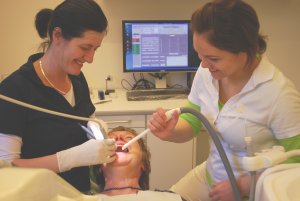
No treatment can guarantee to be a complete and permanent bruxism cure, as teeth grinding is an involuntary and unconscious action. When a person suffers at night, the important thing is to become aware of the problem, often thanks to an attentive partner. The first step in treating bruxism is usually to limit further damage with a teeth grinding guard.
A consultation with a dental professional should be your first step in confirming diagnosis and assessing the extent of any damage caused. Restorative procedures can help repair your teeth if necessary.
If you are able to understand what causes or triggers the condition, you may be able to stop grinding your teeth altogether in the long term.
FAQs
What causes teeth grinding?
There are many factors that can make people grind their teeth or clench their jaw involuntarily. Around 70% of diagnosed bruxism cases result from stress or anxiety. Psychological conditions and various medicines and drugs can also contribute.
Should I be worried about a baby grinding their teeth?
Babies sometimes grind their teeth during the day or night, especially when teeth first appear. Teeth grinding in toddlers and children may be a sign of another condition that requires treatment. It’s worth mentioning it to their doctor, just in case.
Why do people grind their teeth in their sleep?
Stress and anxiety are the main reasons why people experience sleep bruxism. It can also be linked to mouth breathing, sleep apnoea and snoring, which all indicate a problem with airflow while sleeping.
How can you stop clenching your jaw?
If you often find yourself clenching your teeth or jaw, you can relieve some tension using bruxism exercises. Spend a few minutes a day relaxing your jaw in this way and it should make a difference. The video above has some suggestions.
How to stop grinding teeth in sleep naturally?
If you don’t consider a bruxism mouth guard ‘natural’ then there are a couple of other things to try. First of all, try to sleep on your side, rather than your back. Regular exercise can help, as can relaxation techniques such as having a warm bath before bed and avoiding caffeine and alcohol in the evening.
What are some tips for sleeping with a mouth guard?
If you have trouble sleeping with your bruxism guard, try wearing it around the house during the day so you get used to having it in your mouth.
You may also want to try a different style. Some people prefer a teeth grinding splint which sits between their back teeth, whereas others find a custom-made mouth guard for teeth grinding more comfortable.
The Bruxism Association: What Is Bruxism? Consulted 27th October 2020.
NHS: Teeth grinding (bruxism). Consulted 27th October 2020.




